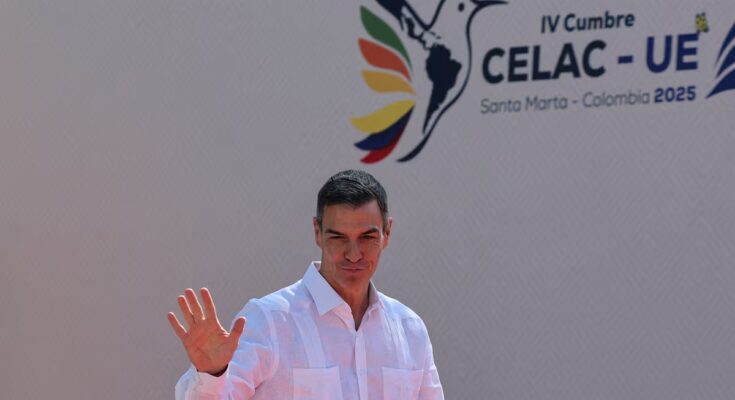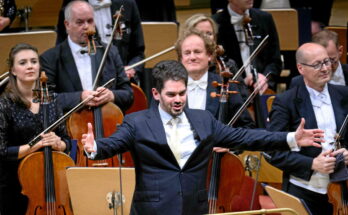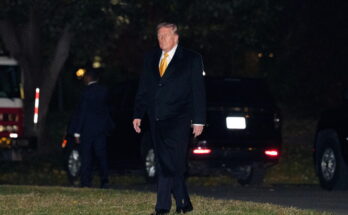Almost no one wants to clash directly with Donald Trump in Santa Marta, Colombia, 3,000 kilometers from the coast of the United States and very close to the border with Venezuela, the country where the leader of the most powerful army on the planet threatens to intervene militarily to put an end to the regime of Nicolás Maduro. Nobody speaks clearly about him, and the noisy Latin American and European absences at the EU-CELAC (Community of Latin American and Caribbean States) summit are also a way to avoid clashing with him.
But in reality Trump is present in all the debates, and his attacks on Venezuelan ships, the killing of crew members under the excuse that they were transporting drugs and the transfer of an aircraft carrier to the coasts near Venezuela, play a big role in the atmosphere of the summit. And in that context, the Spanish president Pedro Sánchez, one of the protagonists of the summit with the Brazilian Lula, proposed himself in Colombia as an anti-Trump leader who defends a multilateral world of collaboration and agreements completely different from that of the American far right.
Sánchez and Lula, supported by other progressive Latin American presidents such as the Chilean Gabriel Boric or the Uruguayan Yamandú Orsi, and a little less by the Colombian Gustavo Petro himself, who is going through difficult times, are seeking alliances both in America and in Europe against Trump and his imperial vision of a world dominated by bilateral relations between him and certain presidents and by the imposition of his decisions with the force of his economy or his army, both the most powerful in the world. In his speech at the summit, Sánchez then filled his speech with references to that rules-based multilateral world as opposed to Trump’s world of imposition. “No nation can address global challenges alone,” Sánchez said.
The PSOE leader claims that two years ago, under the Spanish presidency of the EU, he managed to revitalize this forum with a meeting in Brussels attended by virtually all relevant Latin American and European presidents. Now the Colombian Petro has been much less successful in the call, but Sánchez believes that these types of multilateral structures must be maintained precisely to support an alternative world to that of Trump.
Sánchez moved to try to ensure that the summit did not fail and he himself made a great effort to get to Santa Marta de Belém – he had to use two different planes because the large one could not land at the airport of this Caribbean city – and other high-level Spanish leaders also went there such as the vice-president of the Commission Teresa Ribera – president Ursula von der Leyen did not attend – and the president of the EIB and former Minister of Economy Nadia Calvino.
Sánchez thus seeks to keep the link between the EU and Latin America strong at a time when Trump seeks to regain weight in this continent by supplanting the Europeans and Chinese, especially through the new leaders of the Latin American far right.
“If two years ago the EU-CELAC summit was a political priority, today it is a geostrategic imperative. Because the challenges we face – the violation of international law in Gaza or Ukraine, the attacks on free trade, the weakening of global governance – concern us all”, explained Sánchez.
“The world has changed a lot since our last summit in Brussels. And in such a changed world, this alliance offers something essential: trust. A relationship based on principles, mutual respect and shared vision. Europe and Latin America can and must be a beacon of stability, prosperity and openness in this uncertain and risk-filled time”, insisted the Spanish president.
Sánchez received applause when he proposed that the next UN secretary general be a woman and Latin American. One of the most appreciated is Rebeca Grynspan, former secretary general of the Ibero-American secretary general, but also Michelle Bachelet, former president of Chile, or Susana Malcorra, former Argentine chancellor during the presidency of Mauricio Macri.
The Spanish president also used the forum to exert pressure in favor of the definitive ratification of the EU-Mercosur agreement, which Spain hopes to obtain by the end of the year, around December 20, when the next summit of this group of countries from the south of the American continent will be held.
France continues to resist and Emmanuel Macron was not present at the EU-CELAC summit, a clear gesture of distance, but was in Mexico, where he sought to strengthen bilateral relations. The EU is also working to strengthen its ties with Mexico again in an alternative to the Trump world of which Sánchez is a standard-bearer. Despite resistance from France, Sánchez is convinced that ratification will take place by the end of the year, according to sources in La Moncloa.
“Europe continues to be the main investor in Latin America, with Spain in the lead,” said Sánchez in response to this advance by the United States and China on the continent. “My country is also one of the largest contributors to the Global Gateway Agenda. Of the 9.4 billion euros that, two years ago, we committed to contributing until 2027, we have already mobilized 5,300 for operations in the region and connectivity projects, green and digital transition, healthcare and sustainable infrastructure. From Hispasat satellites in Central America to the electricity interconnection between Chile and Peru, this cooperation creates a shared future,” he insisted.
Sánchez also took the opportunity to make a new request for positive discourse on immigration, precisely in Colombia, where the issue is very delicate due to the deportations that Trump is carrying out, confronting Petro in a very aggressive way. “The European Union and Latin America are much more than just partners: we are intertwined families. Millions of Latin Americans and Caribbeans contribute to Spain’s progress today, in the same way that Latin America welcomed thousands of Europeans seeking hope throughout the 20th century. Our common history is a bridge that continues to grow on the best possible pillars: our people,” concluded Sánchez.
The Spanish president thus consolidates his anti-Trump line of discourse, even if he avoids direct clashes with him and never mentions him. For Sánchez, as he underlined in the interview with EL PAÍS this Sunday, the great political battle of the coming years is this, between those who are committed to multilateralism and science, and therefore in the fight against climate change, against Trump and his allies, who abandon multilateral forums and commit to fighting the battle alone and according to the law of the strongest.



